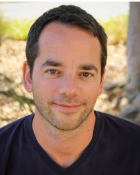
Sam Cumming

Tristen Cardwell
Sam Cumming is Associate Professor of Philosophy at UCLA. His research focuses on philosophy of language, philosophy of mind, literature, and film. His co-authored article “Conventions of Viewpoint Coherence in Film” appeared in Philosophers’ Imprint in 2017. He was interviewed by Tristen Cardwell. Tristen is a first-year student in the Department of Philosophy. She is interested in topics in philosophy of language, logic, and philosophy of mind, especially self-reference and self-consciousness.
TC: I know you received your Ph.D. from Rutgers. But where did you do your undergrad degree?
SC: I’m from Melbourne, Australia, and I did it at the University of Melbourne. I was also an English major when I was an undergrad, and I mostly satisfied things in that major until my third year when I went on exchange to UC Berkeley, and that’s where I got a lot of the philosophy part of my degree done.
TC: What research have you been working on lately?
SC: The things I’ve done in the past have been on traditional topics in the philosophy of language like attitude reports, and content. And I’m working on a fairly mainstream topic in the philosophy of language right now, which is about different kinds of lexical meaning. So I’m looking at on the one hand words that have definitions that provide necessary and sufficient conditions for something to belong to the extension of that word, versus words that are vague.
So, a vague predicate does not come with such a definition. A word like ‘tall’ is not defined as so many feet and inches in height, though it does tell you—this is part of its meaning—that height is the dimension relevant for applying ‘tall’, and also that a greater height is a better reason for applying ‘tall’ than a lesser height is. And then finally, there are words that are open-textured, where no set of dimensions or features is fixed as the basis for applying the word—you can always add more—and so their meaning is even weaker than the meaning of a vague word.
Another thing is this project with Gabe Greenberg [another UCLA Department of Philosophy faculty member] and Rory Kelly, on what you might call discourse-level semantics of film. Film describes a space that in some sense encompasses and is larger than, say, the small chunks of space that you actually see in the different shots in the film. There’s some bigger space in which it’s all embedded. And there are rules that we’re uncovering, or just sort of regularities or conventions by which filmmakers indicate to the viewer what the spatial relationships between the shots are. You might have thought, oh, the camera is just like some viewer. And you imagine that, when the camera takes different positions, that viewer is moving around in the scene. But, if that’s true, then the viewer is teleporting instantaneously to all different parts of the scene. But what these rules show is that they can’t just teleport anywhere. There are certain constraints the filmmaker can suggest that will allow you to anticipate exactly where the viewer is going to teleport. Even though it’s teleporting. It’s not just moving its head from one side to the other or doing something that a normal viewer could do. It’s teleporting to a different part of the scene, but the filmmaker can indicate where or at least what angle that transition is going to be. So those are some of my immediate projects….
TC: What is your favorite course to teach?
SC: The Aesthetics of Poetry is something that I’ve enjoyed teaching the two times I’ve taught it so far. Another is Meaning and Communication. It’s an introduction to issues in philosophy through the lens of language or through the lens of meaning and communication, but one that doesn’t presuppose logic. Philosophy of language, historically, is entangled in logic, and the upper division courses in philosophy of language all have the first course in logic as a prerequisite. The previous assumption was that your pathway to philosophy of language was via logic. And perhaps because it wasn’t my own pathway to philosophy of language—
TC: Sure, not mine either.
SC: Yeah. I don’t have anything against logic. I like logic. But I think this class shows that most, if not almost all, of the issues in philosophy of language can be approached without knowledge of logic, without really talking about entailment or anything like that.
A favorite I taught in the past, and might revisit, was a class on narrative, where we broke down narratives and saw how they worked. Now narrative is something you can’t avoid. And just like in the case of edited film, there is a lot of invisible structure there, which a bit of investigation can bring out, and then you can process it with more awareness. So I didn’t have to ask in that class, “What are you getting out of this, what’s useful for you?” I’m sounding very utilitarian. That’s not really at all how I think about philosophy in general, but it’s how I think about teaching from time to time.
“Film describes a space that in some sense encompasses and is larger than, say, the small chunks of space that you actually see in the different shots in the film. There’s some bigger space in which it’s all embedded. And there are rules that we’re uncovering, or just sort of regularities or conventions by which filmmakers indicate to the viewer what the spatial relationships between the shots are.”
TC: Could you elaborate on how you think about philosophy in general?
SC: I think philosophy grows out of, and should try to never lose touch with, this predicament we find ourselves in—whenever it is we become conscious of it; my son is only almost three, so he’s not there yet; but maybe around six or seven, I’m not sure. Anyway, I read about this reality TV show, Darkness, where they drop people into a subterranean labyrinth and leave them there without any lights, and they have to somehow find their way back to the surface. It’s a metaphor for our predicament in life (the show’s producer was a philosophy student, as it happens), except that in life it’s worse, there isn’t a way out of the cave. We are dropped in with our animal instincts and desires, but those don’t make any provision for the concept that there isn’t a way out. Instead we have to develop ourselves in a way that is available to us, luckily, because we are human. We have to come to terms with the fact that there’s no way out; we try to make sense of it, emotionally and rationally, somehow. One of the literary critics we look at in my aesthetics class, Yvor Winters, sees this as the purpose of literature; it articulates a way of coming to terms with some part of life, a stable attitude integrating emotion and reason. And he makes the point, in passing, that philosophy does this too, in its own quite distinct way. You might think that philosophy is more focused on the rational side of this, but it’s obvious—especially once you consider traditions outside the contemporary analytic one— that the emotions are addressed too.
TC: So how about advice for students? Grads or undergrads.
SC: Well, if you ask people for advice, they’re probably going to tell you what worked for them. Keep in mind that it’s a good source of brainstorming for solutions to your problem, but it may not be something that you need to follow, because the chances that it applies to your case are unknown. But one thing that I had to learn, that I was worried for a while about: dawdling, in some sense, and taking too much time to get through. You might think, on the whole, it’s better to get things done as quickly as you can. But you can put a lot of pressure on yourself that way. I think in philosophy you can definitely be a late bloomer. And so I think it’s okay to explore various other things that you’re interested in and then maybe come back to philosophy. Even if it means you put whatever academic life you foresee for yourself on hold, if you can. I don’t think that’s a bad idea, just slowing things down. I know people who regret having gone through various stages of whatever—it doesn’t have to be an academic career—very fast, focusing on that to the exclusion of other things, and then regretting that they didn’t spend those years doing something different. So I don’t really have regrets of that form. So that’s something.



